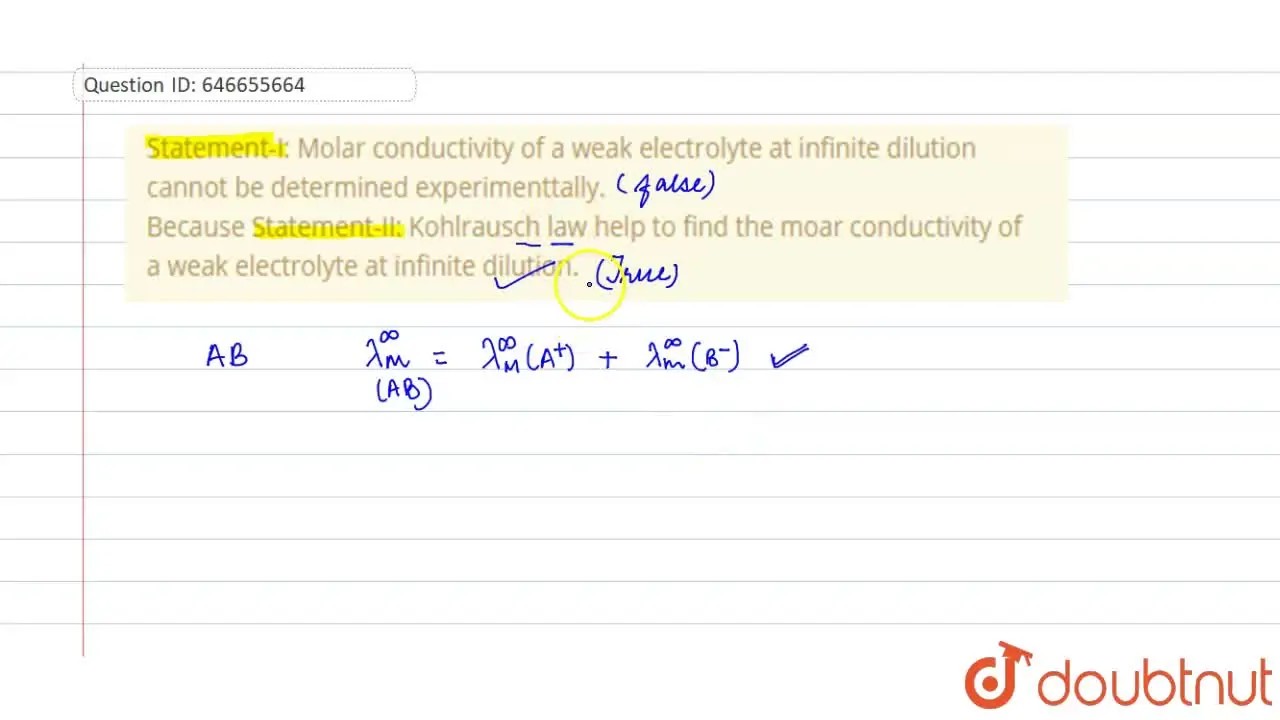Statement-I: Molar conductivity of a weak electrolyte at infinite dilution cannot be determined experimenttally.
Because Statement-II: Kohlrausch law help to find the moar conductivity of a weak electrolyte at infinite dilution.
The correct Answer is:B
Step by step video & image solution for Statement-I: Molar conductivity of a weak electrolyte at infinite dilution cannot be determined experimenttally. Because Statement-II: Kohlrausch law help to find the moar conductivity of a weak electrolyte at infinite dilution. by Chemistry experts to help you in doubts & scoring excellent marks in Class 12 exams.
Related Playlists
- BOOK - ALLENCHAPTER - ELECTROCHEMISTRYEXERCISE - EXERCISE-04 [A]55videos
ELECTROCHEMISTRY
- BOOK - ALLENCHAPTER - ELECTROCHEMISTRYEXERCISE - EXERCISE-04 [B]23videos
ELECTROCHEMISTRY
- BOOK - ALLENCHAPTER - ELECTROCHEMISTRYEXERCISE - EXERCISE-0235videos
ELECTROCHEMISTRY
- BOOK - ALLENCHAPTER - CHEMISTRY AT A GLANCEEXERCISE - ORGANIC CHEMISTRY472videos
CHEMISTRY AT A GLANCE
- BOOK - ALLENCHAPTER - HYDROCARBONEXERCISE - MCQ15videos
HYDROCARBON
Similar Questions
State Kohlrausch law for electrical conductance of an electrolyte at infinite dilution.
View SolutionThe increase in equivalent conductivity of a weak electrolyte with dilution is due to :
View SolutionWhat is the effect of decreasing concentration on the molar conductivity of a weak electrolyte?
View SolutionExplain with a graph the variation of molar conductivity of a strong electrolyte with dilution.
View SolutionWhich of the following will have greatest molar conductance at infinite dilution?
View SolutionAssertion:Kohlrausch law helps to find the molar conductivity of weak electrolyte at infinite dilution.
Reason:Molar conductivity of a weak electrolyte at infinite dilution cannot be determined experimentally.View SolutionA weak electrolyte obeys Ostwald's dilution law. Select the correct statements.
View SolutionSTATEMENT 1 The molar conductance of weak electrolyte at infinite dilutin is equal to sum of molar conductanced of cation and anion and
STATEMENT 2 Kohlraushc 's law is applicable for both strong and weak electrolytesView SolutionThe molar conductivity at infinite dilution of a strong electrolyte can be obtained by extrapolating the curve λm versus √c but same cannot be done for a weak electrolyte. Explain.
View SolutionMark out the correct statement(s) regarding electrolytic molar conductivity.
View Solution


